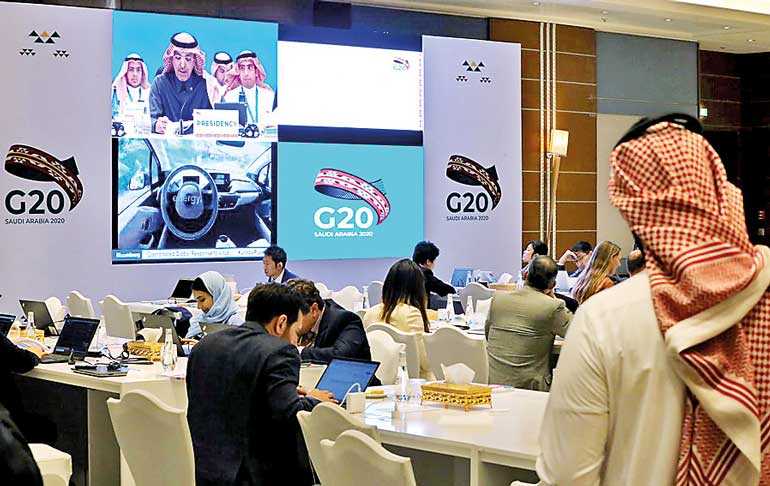Tuesday Feb 24, 2026
Tuesday Feb 24, 2026
Tuesday, 25 February 2020 00:00 - - {{hitsCtrl.values.hits}}

FILE PHOTO: Journalists sit in the media center during the meeting of G20 finance ministers and central bank governors in Riyadh, Saudi Arabia – Reuters
RIYADH (Reuters): Finance officials from the world’s 20 biggest economies (G20) on Sunday referenced climate change in their final communique for the first time in US President Donald Trump’s administration, but stopped short of calling it a major risk to the economy.
The United States blocked including climate change on a list of downside risks to global growth that had won agreement by nearly all other G20 delegates, but ultimately agreed to permit a reference to the Financial Stability Board’s work examining the implications of climate change for financial stability.
US Treasury Secretary Steven Mnuchin played down the importance of the language included, calling it a “purely factual” reference to work being done by the FSB. But several G20 sources said it marked progress toward greater recognition of the economic risks posed by climate change.
“I did not bend to pressure from the Europeans,” Mnuchin told reporters after the release of the communique, bristling at the characterization of one reporter.
Saudi Finance Minister Mohammed al-Jadaan, hosting the meeting in Riyadh, told reporters that climate change remained a very important issue on the Saudi G20 presidency agenda and that there had been discussions related to “financial risks at large” linked to the issue.
Discussions related to “climate change and environmental protection” would continue at ministerial meetings and in technical groups throughout the year, he said.
One G20 source said it was the first time a reference to climate change had been included in a G20 finance communique during Trump’s presidency, even though it was removed from the top of the joint statement.
US officials have resisted naming climate change as an economic risk since Trump took office in 2017. One of his first acts as president was to announce Washington’s withdrawal from the Paris climate accord.
Asked why Washington did not back a broader reference to climate change in the communique, Mnuchin told Reuters, “This is an economic forum, so issues of disclosure and an FSB report are relevant, but the broader issue is just not as applicable.”
Delegates worked out the compromise this weekend after Washington objected to a proposal to add “macroeconomic risk related to environmental stability” to a list of downside risks to global growth, two G20 diplomatic sources said.
The final version of the communique eliminated those words from the first paragraph, leaving the only mention of climate concerns in the context of the work being done by the FSB further down in the document.
That passage reads: “Mobilizing sustainable finance and strengthening financial inclusion are important for global growth and stability. The FSB is examining the financial stability implications of climate change.”
“We welcome private sector participation and transparency in these areas.”
Escalating concerns
G20 finance ministers and central bankers met in the Saudi capital on Saturday and Sunday to discuss top global economic challenges, including the spread of coronavirus.
Concerns about the economic impact of climate change have escalated in recent years and pressure is mounting on business to accelerate the shift to a low-carbon economy ahead of United Nations climate talks in November.
A report issued last week forecast the world’s financial services sector risks losses of up to $1 trillion if it fails to respond quickly to climate change and is hit by policy shifts such as the introduction of a carbon tax.
The International Monetary Fund included climate-related disasters in a list of risks that could derail a “highly fragile” projected recovery in the global economy in 2020.
It estimated that a typical climate-related natural disaster reduced growth by an average of 0.4 percentage points in the affected country the year it occurred.
“We should not hide away from what is going on. The climate crisis is upon us,” IMF chief Kristalina Georgieva told a conference in Riyadh on Friday ahead of the G20 talks.
In a statement after the meetings ended, Georgieva called for concerted action “to scale up climate change mitigation and adaptation.”
The communique forecasts a modest pick-up in global growth this year and next, but cites downside risks to this outlook stemming from geopolitical and remaining trade tensions and policy uncertainty.